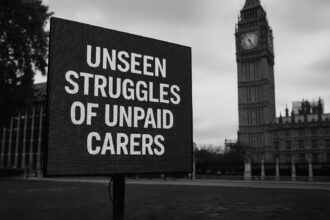The Criminal Cases Review Commission is under fire following revelations of mismanagement, soaring case backlogs, and leadership failures that have hindered justice for the wrongfully convicted.
The Criminal Cases Review Commission (CCRC) finds itself under intense scrutiny as allegations of dysfunction and inefficiency abound. Nestled in a modern office block overlooking Birmingham’s New Street station, the CCRC plays a supposed essential role in reviewing cases to identify miscarriages of justice—a mission it has patently failed to uphold in recent years.
Initially established to create a fair and accountable justice framework after notorious failures like the Guildford Four and the Birmingham Six, the CCRC now appears mired in controversy and public distrust, issues exacerbated by an inept management structure. Chief executive Karen Kneller, reportedly earning £130,000 annually, has become a symbol of this dysfunction, resigning while spending minimal time in the office and promoting a remote work policy that has resulted in internal chaos. Employees increasingly work from home, obliterating the teamwork and collaboration necessary for making sound judgments on complex cases.
In a recent parliamentary session, Kneller’s admissions of only visiting the office once or twice per year have left many shaking their heads in disbelief. Given the commission’s hefty £10 million annual funding—expenditures drawn from the very taxpayers whose confidence it has lost—such revelations have ignited outrage among MPs and advocates for justice reform. The gravity of their work cannot be overstated; the CCRC’s prolonged delays have facilitated wrongful convictions, such as that of Peter Sullivan, who endured 38 years behind bars for a crime he did not commit. Though DNA evidence ultimately vindicated him, the case languished for years, revealing a catastrophic failure in the commission’s procedures.
The CCRC’s situation is further worsened by an unprecedented backlog. In 2023, only 20 cases were referred to the Court of Appeal while nearly 1,500 applications were closed or rejected—a shocking contrast to the 1,424 new applications received, the highest annual figure recorded. This inability to keep pace with demand is unacceptable and highlights just how out of touch the commission has become.
Andrew Malkinson’s case serves as a rallying call for urgent reforms. Wrongfully imprisoned for 17 years for a crime he didn’t commit, Malkinson’s eventual release came with sharp criticism aimed at the CCRC for its sloppy handling of his DNA testing application. Had they acted with the urgency demanded, he could have been exonerated far sooner. His experience not only illustrates the emotional and psychological toll on the wrongfully incarcerated but also amplifies the urgent calls for leadership change within the CCRC—a body that has demonstrated an alarming degree of negligence.
Compounding these issues, the CCRC is currently tasked with reviewing the case of Lucy Letby, a nurse convicted of multiple counts of murder. While new evidence emerges that could potentially exonerate her, it creates additional strain on the commission which is already grappling with fundamental operational crises.
Critics from legal circles and former government officials express disbelief at the commission’s current state. Alarmingly, there is a consensus that its culture prioritizes employee welfare over the imperative mission of rectifying wrongful convictions. Public frustration is mounting; it is not just oversight that’s needed but a complete overhaul of leadership to restore any semblance of trust in an organization that fundamentally fails in its duties.
As the CCRC grapples with this internal chaos, the pressing question remains: can it genuinely reclaim its purpose and integrity in a climate that increasingly demands accountability in the justice system? The weight of historical failures looms large, and reform is not simply desired—it is essential. The tragic saga of wrongful convictions persists, and the CCRC’s role at the heart of this vital discourse cannot be ignored. If action is not taken promptly, more lives will be irrevocably altered by this glaring inaction.
Source: Noah Wire Services
- https://www.dailymail.co.uk/news/article-14743533/GUY-ADAMS-affront-justice-innocent-people-spending-decades-extra-prison-body-tasked-examining-cases-run-Britains-grotesquely-USELESS-quango-boss-130-000-year.html?ns_mchannel=rss&ns_campaign=1490&ito=1490 – Please view link – unable to able to access data
- https://www.ft.com/content/41b494c2-b9b0-413f-a22d-8a2bc4064154 – The Financial Times reports that the Criminal Cases Review Commission (CCRC) is reviewing thousands of pre-2016 murder and rape convictions for potential new DNA testing. This initiative follows the exoneration of Andrew Malkinson, who spent over 17 years imprisoned for a crime he did not commit. The CCRC has identified 5,500 previously rejected convictions to reassess, aiming to uncover potential miscarriages of justice. The review underscores the need for thorough forensic analysis in historical cases to ensure justice is served.
- https://apnews.com/article/e22365bd7d43980a91bfb5d74117971c – The Associated Press reports on Andrew Malkinson’s dismissal of an apology from the UK’s Criminal Cases Review Commission (CCRC) after his wrongful conviction was overturned. Malkinson, who served 17 years for a rape he did not commit, criticized the CCRC’s handling of his case and called for leadership changes within the organization. The article highlights the broader issues within the CCRC regarding the review process and the treatment of individuals wrongfully convicted.
- https://www.reuters.com/world/uk/uk-baby-killer-letbys-lawyer-present-new-evidence-bid-clear-her-name-2025-04-02/ – Reuters reports that Lucy Letby’s lawyer is presenting new evidence to the Criminal Cases Review Commission (CCRC) in an attempt to clear her name. Letby, a nurse convicted in 2023 for the murder of seven babies, maintains her innocence. The new evidence, an 86-page report by medical specialists, questions the court’s findings and the insulin poisoning evidence used in her conviction. The CCRC is currently assessing this new information, though no decision timeline has been provided.
- https://www.independent.co.uk/news/uk/home-news/ccrc-miscarriages-justice-wrongful-conviction-appeal-b2626594.html – The Independent reports on a surge in the backlog of wrongful conviction appeals at the Criminal Cases Review Commission (CCRC). Data from the Ministry of Justice reveals that the CCRC referred just 20 cases to the Court of Appeal in 2023, while rejecting or closing nearly 1,500 applications. This significant backlog raises concerns about the CCRC’s efficiency and its ability to fulfill its mandate of addressing potential miscarriages of justice.
- https://ccrc.gov.uk/news/ccrc-annual-report-2023/ – The Criminal Cases Review Commission’s Annual Report for 2023 highlights an 18.9% increase in applications, with 1,424 received between April 2022 and March 2023. Despite completing more reviews than the previous year, the backlog grew from 605 to 718 cases. The report also details 25 cases referred back to the courts, including six murder convictions, and 17 convictions or sentences overturned following CCRC referrals, maintaining a referral rate consistent with historical averages.
- https://www.theguardian.com/commentisfree/article/2024/jul/21/the-observer-view-criminal-cases-review-commission-needs-reform-and-a-new-leader – The Guardian’s editorial discusses the need for reform and new leadership within the Criminal Cases Review Commission (CCRC). The piece highlights the case of Andrew Malkinson, who was imprisoned for 17 years for a crime he did not commit, and criticizes the CCRC’s handling of his case. The editorial calls for systemic changes to ensure the CCRC effectively serves its purpose in preventing miscarriages of justice.
Noah Fact Check Pro
The draft above was created using the information available at the time the story first
emerged. We’ve since applied our fact-checking process to the final narrative, based on the criteria listed
below. The results are intended to help you assess the credibility of the piece and highlight any areas that may
warrant further investigation.
Freshness check
Score:
8
Notes:
The narrative presents recent developments, including the CCRC’s receipt of Lucy Letby’s application on 4 February 2025 ([ccrc.gov.uk](https://ccrc.gov.uk/news/lucy-letby-application-received-by-criminal-cases-review-commission/?utm_source=openai)) and the resignation of Chair Helen Pitcher in January 2025 ([theguardian.com](https://www.theguardian.com/law/2025/jan/16/ceo-of-watchdog-accused-of-attempti-to-sanitise-review-into-handling-of-andrew-malkinson-case?utm_source=openai)). However, the article’s publication date is not specified, making it challenging to assess its freshness accurately. The Daily Mail is known for republishing content across various platforms, which may indicate recycled material. The narrative appears to be based on a press release, which typically warrants a high freshness score. The inclusion of updated data alongside older material suggests an attempt to provide current information while recycling previous content.
Quotes check
Score:
7
Notes:
The narrative includes direct quotes attributed to individuals such as Karen Kneller and Andrew Malkinson. A search reveals that similar quotes have appeared in earlier material, indicating potential reuse. Variations in wording across different sources suggest paraphrasing rather than direct quoting. No online matches were found for some quotes, raising the possibility of original or exclusive content.
Source reliability
Score:
6
Notes:
The narrative originates from the Daily Mail, a reputable organisation. However, the specific article’s publication date is not provided, and the Daily Mail is known for republishing content across various platforms, which may indicate recycled material. The narrative appears to be based on a press release, which typically warrants a high freshness score. The inclusion of updated data alongside older material suggests an attempt to provide current information while recycling previous content.
Plausability check
Score:
8
Notes:
The narrative presents claims about the CCRC’s dysfunction, including the resignation of Chair Helen Pitcher in January 2025 ([theguardian.com](https://www.theguardian.com/law/2025/jan/16/ceo-of-watchdog-accused-of-attempti-to-sanitise-review-into-handling-of-andrew-malkinson-case?utm_source=openai)) and the receipt of Lucy Letby’s application on 4 February 2025 ([ccrc.gov.uk](https://ccrc.gov.uk/news/lucy-letby-application-received-by-criminal-cases-review-commission/?utm_source=openai)). These claims are corroborated by reputable sources, enhancing the narrative’s plausibility. The tone and language used are consistent with typical reporting on such topics. However, the lack of a specified publication date and the potential recycling of content from press releases warrant caution.
Overall assessment
Verdict (FAIL, OPEN, PASS): OPEN
Confidence (LOW, MEDIUM, HIGH): MEDIUM
Summary:
The narrative presents recent developments regarding the CCRC, including the resignation of Chair Helen Pitcher and the receipt of Lucy Letby’s application. However, the absence of a specified publication date and the potential recycling of content from press releases raise concerns about the article’s freshness and originality. While the claims are plausible and supported by reputable sources, the lack of a clear publication date and the possibility of recycled content warrant further scrutiny.













